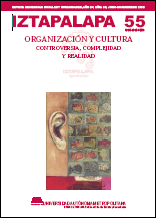Lo universal y lo cultural en el funcionamiento de las organizaciones
Palabras clave:
Cultura, organizaciónResumen
¿Cuál es la influencia de la cultura de un país en relación con las herramientas administrativas de carácter internacional que emplean las organizaciones? ¿Hasta qué punto las reflexiones acerca de la cultura comprometen la heterogeneidad de ésta en determinada nación respecto a las funciones administrativas de las empresas? ¿Cómo lo local y lo universal se combinan? Son algunas de las reflexiones que se plantean en el siguiente artículo, mostrándonos además la importancia de la cultura entendida como el contexto en donde las acciones organizacionales adquieren sentidoDescargas
Citas
Abeglen, J. C. 1958 The Japanese Factory: Aspects of its Social Organization, The Free Press, Glencoe.
Banfield, E. C. 1958 The Moral Basis of a Backward Society, The Free Press, Glencoe.
Berstein, Ronald E., y Jean-François Arvis 2002 Implementing Anticorruption Programs in the Private Sector, The World Bank, Prem notes, núm. 66.
Bourrier, Mathilde 1999 Le nucléaire à l’épreuve de l’organisation, Presses Universitaires de France, París.
Chapman, Malcolm 1986 “Social Anthropology, Business Studies, and Cultural Issues”, en International Studies of Management and Organization, vol. 26, núm. 4, pp. 3-29.
Child, John, y Alfred Kieser 1979 “Organizational and managerial roles in British and West German companies: an examination of the culture free thesis”, en Cornelis J. Lammers y David J. Hickson, eds., Organizations Alike or Unlike, Routledge & Kegan, pp. 251-271.
Chow, C. W., Y. Kato y K. A. Merchant 1996 “The use of organizational controls and their effects on data manipulation and management myopia: A Japan vs. US comparison”, en Accounting, Organizations and Society, vol. 21, núms. 2-3, pp. 175-192.
Crozier, Michel 1963 Le phénomène bureaucratique, Le Seuil, París.
Durkheim, Émile 1912 Les formes élémentaires de la vie religieuse, F. Alcan, París.
Friedberg, Erhard 2000 “Societal or systems effects”, en Marc Maurice y Arndt Sorge, eds., Embedding Organizations, Benjamins, Amsterdam, pp. 57-70.
Fukuyama, Francis 1995 Trust: Social Virtues and the Creation of Prosperity, Hamish Hamilton, Londres.
Geertz, Clifford 1973 The Interpretation of Cultures, Basic Books, Nueva York.
Gibson, Cristina B., y Mary E. Zellmer-Bruhn 2001 “Metaphors and meaning: An intercultural analysis of the concept of teamwork”, en Administrative Science Quarterly, núm. 46, pp. 274-303.
Haire, Mason, Edwin E. Ghiselli y Lyman W. Porter 1966 Managerial Thinking: An International Study, Wiley, Nueva York.
Hall, Edward 1965 The Silent Language, Fawcet, Greenwich [1959].
Henry, Alain 2003 “La révolution des procédures au Cameroun”, en Philippe d’Iribarne, Le Tiers-Monde qui réussit, Le Seuil, París, pp. 95-132.
Herder, Johann Gottfried 2000 Une autre philosophie de l’histoire, Flammarion, París [1774].
Hofstede, Geert 1980 Culture’s Consequences: International Differences in Work-Related Values, Sage, Londres.
Iribarne, Philippe d’ 1989 La logique de l’honneur, Le Seuil, París.
Iribarne, Philippe d’ 1992 “Contre l’anticulturalisme primaire”, en Revue française de gestion, núm. 91, pp. 132-137.
Iribarne, Philippe d’ 2002a “Una gestión moderna arraigada en la cultura mexicana”, en Gestión y Política Pública, vol. XI, pp. 187-213.
Iribarne, Philippe d’ 2002b “Motivating workers in emerging countries: universal tools and local adaptations”, en Journal of Organizational Behavior, núm. 23, pp. 1-14.
Iribarne, Philippe d’ 2003 Le Tiers-Monde qui réussit, Le Seuil, París.
Iribarne, Philippe d’, et al. 1998 Cultures et mondialisation, Le Seuil, París.
Kim, Joo Yup, y Sang Hoon Nam 1998 “The concept and dynamics of face: implications for organizational behavior in Asia”, en Organization Science, núm. 9, pp. 522-534.
Koslowsky, Meni, Abraham Sagie y Shmuel Stashevsky 2002 “Introduction: cultural relativism and universalism in organizational behaviours”, en International Journal of Cross Cultural Management, núm. 2, pp. 131-136.
Mc Clelland, C. D. 1961 The Achieving Society, Van Nostrand, Princeton.
Ouchi, William 1981 Theory Z, Avon, Nueva York.
Peters, T. J., y R. H. Waterman 1982 In Search of Excellence, Harper and Row, Nueva York.
Pugh, D. S. 1976 “The ‘Aston’ approach to the study of organizations”, en G Hofstede y M. S. Kassem, eds., European Contributions to Organization Theories, Van Gorcum, Assen, pp. 62-78.
Pugh, D. S., y D. J. Hickson 1976 Organizational Structure in Its Context: The Aston Programme I, Saxon, House, Londres.
Sapir, Edward 1927 The Unconscious: A Symposium, Dummer, Nueva York.
Schein, Edgar 1985 Organizational Culture and Leadership, Josey-Bass, San Francisco.
Schwartz, Shalom H. 1994 “Beyond individualism/collectivism: new cultural dimensions of values”, en U. Kim et al., Individualism and Collectivism, Sage, Londres, pp. 85-119.
Trompenaars, Fons, y Charles Hampden-Turner 1998 Riding the Waves of Cultures. Understanding Diversity in Global Business, McGraw-Hill, 2a. ed.
Womack, James P., et al. 1990 The Machine that Changed the World, Rawson Associates/Collier Macmillan Canada/Maxwell Macmillan International, Nueva York-Toronto.




.jpg)

.png)
.jpg)




.png)
.png)
1.png)
